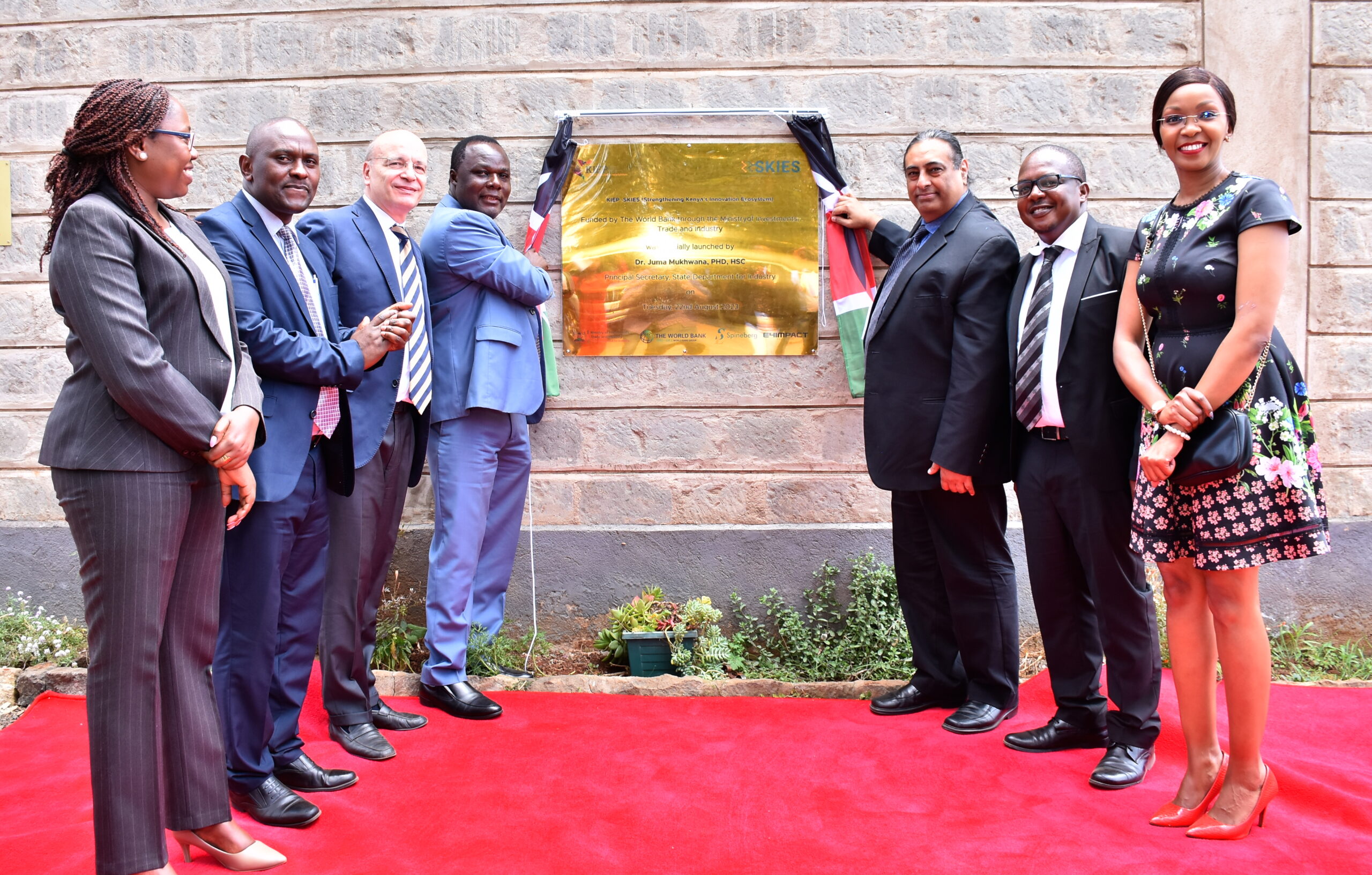Kenya and the World Bank have today invited applications from incubators, accelerators and tech-bootcamp providers for possible funding and business mentorship through the Strengthening Kenya’s Innovation Ecosystem(SKIES) program.
The SKIES program aims to benefit intermediaries that incubate and accelerate enterprises engaged in various value chains such as Leather; Livestock (Dairy and Pastoralism Economy); Garments and Textiles; Industrial Production (Building Materials and Pharmaceuticals); and Crops (Edible Oils, Rice, Tea, Coffee).
Speaking during the event, State Department for Industry Principal Secretary Dr. Juma Mukhwana, said enterprise ecosystem intermediaries are key priority areas as they play a vital role that should be well understood if Kenya is to nurture a robust startup enterprise ecosystem.
“The intermediaries bridge the gap between startups and their transformation into thriving enterprises. As of now, Kenya boasts a burgeoning number of intermediaries with their number being at approximately 200 spread all over the country which are actively contributing to the growth of our innovation ecosystem,” he said.
The Kenyan entrepreneurship ecosystem has witnessed the emergence of numerous business incubators and accelerator initiatives mainly focused on Information, Communication & Technology (ICT) enterprises. While this growth has seen the flourishing of tech start-up support networks, it has also presented both advantages and challenges for these institutions.
David Cheboryot, one of the Directors of the Management Firm and a representative of the E4Impact Foundation, unveiled the visionary initiative. He pointed out that SKIES will be working on three critical pillars of transformation. This will be done through building intermediary capacity, empowering tech education and fostering an environment of collaboration, where intermediaries join hands to enhance startup support and share best practices and ecosystem learnings.
Among the start-up challenges identified are funding gaps (particularly in follow-up funding), policy fluctuations, and regulatory adjustments. The protracted process of business registration, especially in some counties yet to streamline their procedures, remains a significant impediment.
Lack of a uniformed platform to oversee the startup ecosystem has also given rise to issues such as innovation duplication, absence of a national opportunity repository, lack of standardised best practices, information imbalances leading to ‘grantpreneurs’ and intermediaries lacking commitment to excellence.
SKIES, a sub-component of the Sh5 billion Kenya Industry and Entrepreneurship Project (KIEP) funded by the World Bank Group and implemented by the Ministry of Investments, Trade and Industry (MITI), will be implemented in two tracks. The first track will accommodate incubators, and accelerators, where successful applicants will receive financial grants based on individual improvement plans.
The second batch will comprise technology boot camp providers and Rapid Tech Skills students. The boot camp providers will be supported through grants for scaling, while the students will receive subsidies to cover their tuition fees.
The project aims to benefit 20 beneficiaries for Track 1 and 16 beneficiaries for Track 2, along with 532 students who will receive scholarships for rapid tech skills training. We are committed to ensuring regional balancing to represent the diverse face of Kenya among our beneficiaries.
Announced in June 2018 with implementation set to start now, the World Bank approved a $50 million International Development Association (IDA) credit to increase scale innovation and productivity amongst Kenya’s enterprises through the Kenya Industry and Entrepreneurship project (KIEP) is expected to benefit some 33,050 individuals and 2,393 firms.
The program will support the ambitious development targets outlined in Kenya’s Big Four development agenda and Vision 2030 that require significant growth in private sector jobs and overall productivity. The Ministry of Industry, Trade and Cooperatives, through the Kenya Industrial Transformation Program, prioritizes technology and innovation as the cornerstone for national industry development and the role that private sector firms play in driving Kenya’s industrialization.
“We are committed to supporting Kenya in creating employment and business opportunities as part of the county’s wider strategy to fast-track economic growth,” said Diarietou Gaye, World Bank Country Director for Kenya. “While Kenya remains a top innovation leader in Africa, it still ranks 80th out of 127 countries in the 2017 Global Innovation Index and we are partnering with Kenya as it works to improve its human capital, technology and knowledge outputs.”
Currently, Kenya lacks the adequate skills that can produce a solid pool of internationally competitive, technology enabled businesses. SMEs, which are key drivers of the economy, face difficulties in improving their productivity due to poor managerial practices and information failures around how to upgrade. The country also has limited contact between traditional industry and technology enabled startups; a missed opportunity for both sides. Kenya’s other challenge includes limited connections to networks of international mentors, angel investors, and venture capitalists all of which make it difficult for local startups and SMEs to grow and compete internationally. For Kenyan women entrepreneurs, particularly those who own startups and SMEs; all these challenges are even more pronounced.
“In today’s fast-paced, globalized economy, start-up driven innovation is key for economic development as it creates new jobs for the growing youth demographic,” said Elena Gasol Ramos, Senior Private Sector Specialist and Task Team Leader. “By strengthening technology incubators and accelerators, the Kenya Industry and Entrepreneurship Project will directly benefit 250 SMEs, 640 students, 15 corporates, 162 startups, 30 technology hubs and 7 technology bootcamp providers.”

